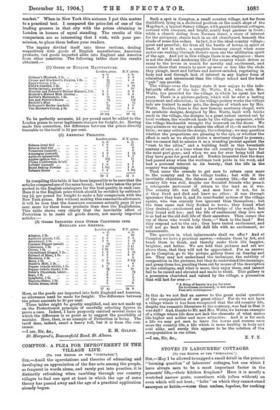Si,—Amid the speculations and theories of educating and developing an
appreciation of the fine arts among the people, so frequent in words alone, and rarely put into practice, it is distinctly refreshing when rambling through our country villages to find one spot at least in which the age of mere theory has passed away and the age of a practical application already begun.
covered with creepers, and bright, neatly kept gardens in front ; while a church dating from Norman times, a store of interest
for the antiquary, stands back in an old churchyard, beneath the shade of some fine cedars. In fact, it is the ideal country village; quiet and peaceful ; far from all the bustle of towns, in spirit at least, if not in miles; a complete harmony except when some motor-car rushing through thrusts upon one the utilitarian spirit of the age. And yet in this village there is no stagnation ; there is not the dull and deadening life of the country which drives so many to the towns in search for novelty and excitement, and causes those that remain to grow up more or less like the clods they plough, inert and listless and narrow-minded, vegetating in body and soul through lack of interest in any higher form of education and amusement than the village school and the local "pub." can provide.
The village owes the happy state it now enjoys to the inde- fatigable efforts of the late Mr. Watts, R.A, who, with Mrs. Watts, has provided for the village in which he spent his last years. There is a picture-gallery, which will be ever a lasting enjoyment and education; in the village pottery works the village lads are trained to make pots, the designs of winch are by Mrs. Watts. Besides, there is the now famous mortuary chapel, with its symbolic designs, designed by Mrs. Watts, built with bricks made in the village, the designs to a great extent carried out by local workers, the woodwork made by the village carpenter, while the village blacksmith wrought the ironwork on the doors. We may admire or we may not admire the effect of it,—it matters but little ; we may criticise the design, the colouring ; we may question whether the proportions are pleasing to the eye or whether the effect is such as we should desire a mortuary chapel to possess ; but we cannot fail to admire it as a standing protest against the "rush to the cities," and a building built in this twentieth century of ours, at a time when the old country trades have for the most part gone; and when we are for ever being told that they have gone for good and all. Ruskin lamented that the days had passed away when the workman took pride in his work, and had a personal interest in its beauty; that the life in the country was stagnating. Then came the crusade to get men to return once more to the country and to the village trades ; but with it the inevitable objection, the dulness of country life,—for the old country life was dull, despite our Socialist friends who preach a retrograde movement of return to the land as it was. The country life was dull, and men knew it not, for in it they lived and died and knew no other ; it was through ignorance they bore it, and its semi-feudal system of the village squire, who was scarcely less ignorant than themselves ; but the time came and they flocked to towns, they found what they desired,—excitement and a knowledge of the world ; but they found evil too : and the life of excitement they live now is as bad as the old dull life of their ancestors. Then comes the cry of those who would help them,—" Back to the land." But they respond not to the cry ; they have tasted excitement, and will not go back to the old dull life with no excitement, no amusements.
The question is, what inducements shall we offer ? And at Compton we have a practical answer,—educate them by Art, and teach them to think, and thereby make their life happier, brighter, and better. We are told that pictures and art are above them, that they will not be appreciated. For an answer go to Compton, go to the picture gallery there on Sunday and see. They may not understand the technique, the subtlety of composition in the pictures, but they do understand the meanings, and grasp them too, puzzling them out by means of the description in the catalogue, and what is more, they enjoy them, and cannot fail to be raised and elevated and made to think. This gallery is a possession cherished and valued by the village, a possession that will last for ever :— " A thing of beauty is a Joy for ever,
Its loveliness increaseth, it will never Pau into nothingness."
In this do we not find an answer to the great social question of the overpopulation of our great cities ? For do we not have a village where it has been recognised that the old country life, despite the romantic literature to the contrary, was bad in that it was dull ? And, thanks to Mr. and Mrs. Watts, we have an example of a village where life does not lack the elements of what makes life higher and nobler and more attractive. And it is for such a life we may get men to leave the towns and resume once more the country life, a life which is more healthy in body and soul alike, and surely this appears to be the solution of the overpopulation in our cities.
—I am, Sir, &c., X. Y. Z.
STOVES IN LABOURERS' COTTAGES.


































 Previous page
Previous page